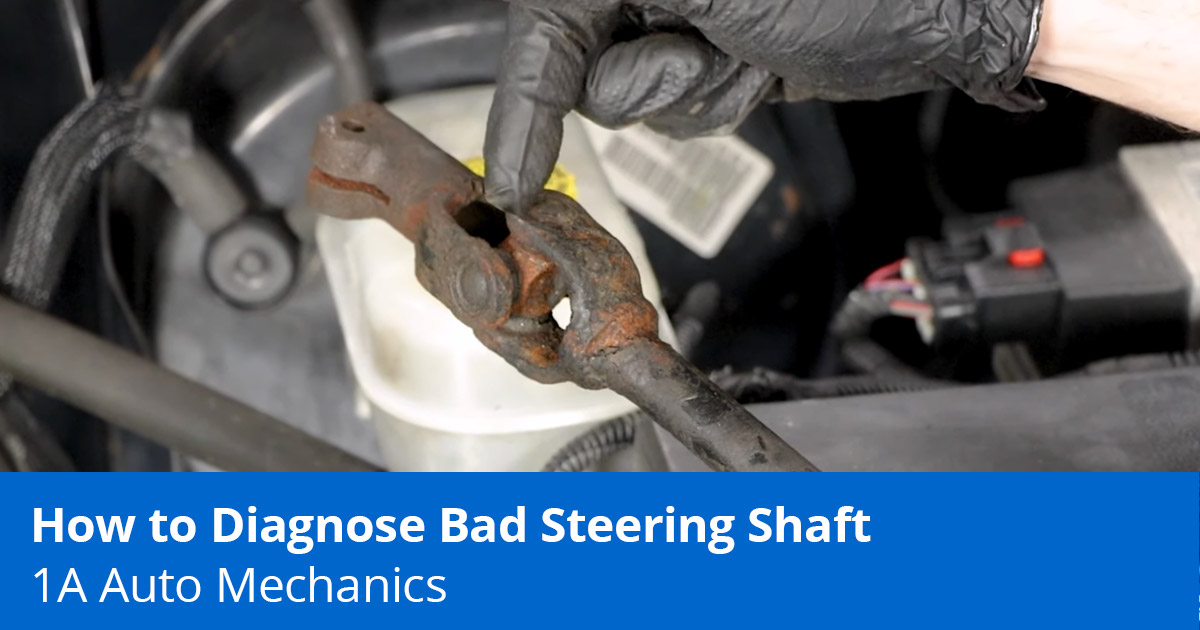
How to Diagnose Steering Wheel Clunking Noise
If you’ve noticed a clunking noise when turning your steering wheel, it’s good to check out sooner rather than later. In this post we’ll show you how to check out the joints in your steering column, to find out if they are binding, or loose and clunky. This could mean you have a bad steering shaft.
What is a Steering Shaft?
The steering shaft is a piece of metal that connects the steering column to the rack and pinion or steering gear. On both ends, it comes with universal joints that allow it to flex any time the vehicle moves over bumps.
This prevents any parts running horizontally from binding. The joints have pin bearings enclosed in cups for smooth operation. When they go bad or corrode, the steering shaft stops functioning as required. Here is a list of some of the most common symptoms of bad steering shaft joints.

Symptoms of Bad Steering Shaft Joints
1. Clunking Noise When Turning
The number one sign of bad steering shaft joints is a clunking noise that comes from the dashboard or steering wheel when turning. A lot of times, you will not need to turn the steering wheel too much to hear the noise.
A slight turn on either side generates a sound that tells you there’s metal to metal contact somewhere. It happens whether you’re driving on the road or sitting still in your driveway. This can be fixed by applying some lubricant but may need further checking to ensure it’s not a more serious problem.
2. Wheels Not Turning
Sometimes, bad steering shaft joints can cause the front wheels not to turn any time you move the steering wheel from side to side. Other times, movement may be slight and not proportionate to the amount of turning you make on the steering wheel.
In worse cases, you may not be able to control the car at all. This can be very dangerous especially if it happens while you’re driving. Your steering wheel should always be precise and responsive every time you make a turn.
3. Stiff Steering Wheel with Knocking Noise
The steering wheel can feel stiff and difficult to turn when you have bad steering shaft joints. It may require more force to engage. Sometimes, it can completely feel too stiff to move. This is often an indication that something is wrong with the steering shaft. It could be that the joints are binding. It should be checked and fixed immediately.
How to Diagnose Steering Shaft Joints
Not every knocking or clunking noise you hear from the front end of your car, whether turning or not, is going to be coming from your steering shaft. There are other parts that could be generating the noise as well. This makes it all the more important to confirm that you indeed have bad steering shaft joints.
- Check Under the Hood
You’ll need to have someone else inside the vehicle turning the steering wheel from side to side as you check under the hood. Depending on the type of car you drive, the steering shaft will go down from the firewall to the steering rack or power steering box.
- Check for Pivoting at the U-Joints.
They should be moving well in all directions as the other person turns the steering wheel. If the grease is gone or the cups are bad, they may produce a clunking noise. In situations where they are extremely corroded, the shaft can separate and fall off while still in use.
- Replace the Steering Shaft as a Whole
Bad steering shaft joints cannot be replaced as single units. You’ll need to replace the steering shaft as a whole. Remember to follow the instructions provided by your manufacturer. You may be required to disconnect your battery and tie off the steering wheel. This helps to avoid damaging the airbag system in some vehicles.
Shop Parts Featured in the Post:
Related Posts on Clunking Noise When Turning:
- How to Replace Steering Shaft
- Too Much Play in Your Steering Wheel
- Power Steering Leak [Expert Advice to Diagnose & Fix]
- Common Subaru Outback Problems: 4th Generation 2010 to 2014
- Front End Clunking Noise While Driving?
- Reddish Fluid Leaking From Your Car?
- Common 2002 to 2009 GMC Envoy Problems

